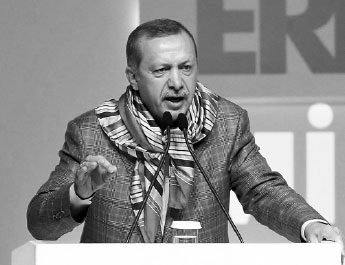Election seen as pivotal for Turkey's future
Turkey is about to kick off its presidential elections on Sunday, and an era of social polarization and pessimistic economic outlook may start to unfold in the country if the front runner Turkish Prime Minister Recep Tayyip Erdogan is elected.
Erdogan, the leading candidate in the polls, has been challenged by Ekmeleddin Ihsanoglu, a candidate that was jointly supported by several political parties.
The third candidate, Selahaddin Demirtas, who was nominated by a smaller Kurdish party, is thought to have little chance of winning.
During the campaign, Erdogan, the current powerful prime minister, does not hide his intention to turn Turkey's parliamentary democracy into a system in which the president ceases to be a ceremonial post.
He said he will exercise full presidential powers if he is elected to the office, signaling that he may make use of a hand-picked caretaker, such as a low-profile prime minister, to impose his views.
His opponent, Ihsanoglu, ex-secretary general of the Organization of Islamic Cooperation, promises to keep the parliamentary system intact.
Kerim Balci, political analyst, said he believed that Erdogan does not have a chance to change the regime, even if he wins the presidential election.
"The first directly elected president of Turkey will still operate within the constitutional framework set for his office by the 1982 Constitution and Turkish political culture," he said. "Erdogan may have the power to win every election in which he participates, but he does not have the opportunity to change these two frameworks."
Changing the system requires a constitutional amendment approved by a qualified majority in the Turkish Parliament. Erdogan's ruling Justice and Development Party does not have enough seats to make that happen.
Moreover, some doubt that a President Erdogan, if elected, would be able to control the government as he wishes.
Joost Lagendijk, a longtime observer of Turkish politics, predicted that Erdogan, if he wins, may trigger a constitutional crisis in Turkey.
"Turkey is entering an experimental, unpredictable period in which an overconfident and bullish president will start looking for the boundaries the present Constitution forces upon him and will push to get rid of them, or, if possible, overrule them," he said.
Another uncertainty that looms large in Turkish politics is who will run the ruling party and the government if Erdogan becomes president.
Erdogan is expected to select a loyalist to succeed him as prime minister, then try to pull strings. It is not certain that this will work as smoothly as Erdogan may hope, however.
According to Balci, Turkish political history has countless examples of politicians betraying others in power grabs.
"The AKP is not an exception," he said, stressing that dissenting voices have already been heard from within the party.
Turkish Deputy Prime Minister Bulent Arinc, one of the heavyweights in the party, signaled on Tuesday night in a TV interview that he is ready to serve as prime minister.
|
Turkish Prime Minister and presidential candidate Recep Tayyip Erdogan speaks during a meeting of his ruling Justice and Development Party (AKP) in Ankara on Thursday. Adem Altan / Agence France-Presse |
(China Daily 08/08/2014 page11)















